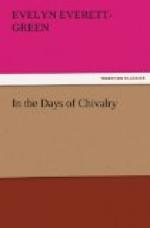That loosening of the bands of nature and affection in times of deadly sickness has always been one of the most terrible features of the outbreaks of the plague when it has visited either this or other lands. There are some forms of peril that bind men closer and closer together, and that bring into bond of friendship even those who have been before estranged; and terrible though these perils may be, there is always a deep sense of underlying consolation in the closer drawing of the bond of brotherhood. But when the scourge of deadly sickness has passed over the land, the effect has almost always been to slacken this tie; the inherent love of life, natural to human beings, turning to an almost incredible selfishness, and inducing men to abandon their nearest and dearest in the hour of peril, leaving them, if stricken, to die alone, or turning them, sick to death though they might be, away from their doors, to perish untended and without shelter. True, there were many bright exceptions to such a code of barbarity, and devoted men and women arose by the score to strive to ameliorate the condition of the sufferers; but for all that, one of the most terrible features of the period of death and desolation was that of the fearful panic it everywhere produced, and the inhuman neglect and cruelty with which the early sufferers were treated by the very persons who, perhaps only a few days or even hours later, had themselves caught the contagion, and were lying dead or dying in the homes from which they had ejected their own kith and kin before.
Of the fearful havoc wrought in England by this scourge of the Black Death many readers of history are scarcely aware. Whole districts were actually and entirely depopulated, not a living creature of any kind being left sometimes within a radius of many miles; and at the lowest computation made by historians, it is believed that not less than one-half of the entire population perished during the outbreak.
But of anything like the magnitude of such a calamity no person at this time had any conception, and little indeed was Raymond prepared for the sights that he was this day to look upon.
The Father and his two assistants went forth after they had partaken of food, and turned their faces westward.
“There is a small village two miles hence that we will visit first,” said the Father, “for the poor people have no pastor or any other person to care for their bodies or souls, and I trow we shall find work to do there. If time permits when we have done what we may there, we will pass on to the little town round the church of St. Michael, whose spire you see yonder on the hillside. Many of the stricken folks within our walls came from thence. The sickness is raging there, and there may be few helpers left by now.”
The same sultry haze the travellers had noticed in the infected regions was still hanging over the woods today as they sallied forth; and though the sun was shining in the sky, its beams were thick and blood-red instead of being clear and bright, and there was an oppression in the air which caused the birds to cease their song, and lay on the spirit like a dead weight.




